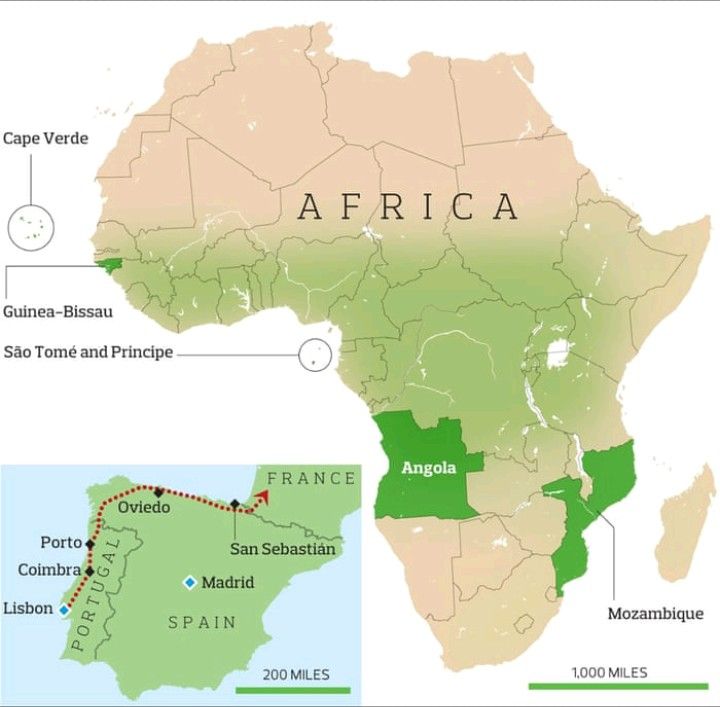Currently, of all the European powers that colonized Africa, Portugal has the smallest economic size. Nigeria, Egypt, and South Africa have larger economies than the Southern European countries. The country’s Gross Domestic Product was a about quarter of a trillion in 2022. The three African countries exceeded that.
Portugal was the first European power to reach the Guinea coast and other littoral territories of Sub-Saharan Africa in the 15th century. The other Iberian Peninsula state of Spain moved mainly westward across the Atlantic during the age of "discovery". It was the Portuguese navigator, Bartolomeu Dias, who first set eyes on the Good Hope in 1488 as a European.
Portugal's relationship with African states and people was largely one of mutual respect and interest—based on trade. The newcomers had mainly established trade posts along the coast with the permission of local Kings. Some of the first places Portugal established itself included the territory covered by present-day Angola (where the Kongo kingdom was well established); Elmina in West Africa and Mozambique.
Later, many posts were established along the African coasts. The Europeans subsequently convinced the local Kings to convert to Christianity in some kind of "faith diplomacy". Some did. The King of Kongo converted and took a Christian name.
Eventually, other European powers including the French, Swedes, Danes, British and Spanish joined Portugal in the lucrative trade on the African coasts.
Much of the colonial strengths and policies of European states largely depended on the strength and political environment of their home states and Europe at large.
By the 17 and 18 centuries, Portugal’s political and naval power had reduced in Europe. Consequently, other European powers came to have more influence on the Africans. Britain, France and later, Germany had become the most formidable European powers in Africa. Even in the Americas, the influence of Portugal and Spain had waned considerable with some territories becoming independent republics.
When Europe decided to partition Africa in the 19th century, Portugal was still a relatively weak state. However, as the first power to have come to the continent, it secured enough space in Africa. After the Berlin conference in early 1885 Portugal had Guinea-Bissau, Angola, Mozambique; and the island territories of Cape Verde and Sao Tome and Principe.
As a colonial power, Portugal treated its colonies as extensions of its European territory. It therefore adopted direct rule as its colonial administration concept with its concomitant principles.
In the 20th century, Portugal was one of the last European powers to grant independence to its colonies. This was after long bloody wars of independence. A coup in Lisbon in the 1970s changed the political landscape of the country. The new rulers hastily granted independence to the colonies which led to years of chaos.
The “hard exit" created a situation where mostly leftist groups gained advantage in the power struggle that came after independence. Portugal joined the West in backing right-wing factions during post-independence civil wars in Africa.
After the Cold War, Portugal fairly succeeded in rekindling its bond with its former colonies in Africa. However, much of its relations with Africa in general lies with the larger EU policy towards the continent. Portugal is among the top five countries Angola currently trades with. It also has some ties with Mozambique and Cape Verde.
With Portuguese adopted as official language by these countries, Portugal still serves as an important cultural partner to them.
Security issues:
While Portugal does not face any serious domestic security challenges, it shares collectively, the security challenges facing the European continent. The issues of trans-Mediterranean migration, energy security and the Ukraine war have become “inescapable” concerns for Lisbon. In Africa, the country is closely cooperating with the security forces of several African states in combating various crimes. In 2021, it had made moves to support Mozambique’s fight against the rising threat of jihadism. Lisbon also asked the European Union to support Mozambique in the fight.
Despite these efforts, Portugal is not as assertive and dominant in the continent as the great powers of Europe, Asia and America.
Verdict:
Even though Portugal is a shadow of its colonial past in Africa, it could cooperate with African states in multiple sectors in a win-win economic and security partnership. As long as it remains a member of the European Union its presence in the continent, especially in Lusophone states could continue to be significant. It is likely to continue benefiting from the expanding markets in Africa.
image: a map showing the Iberian Peninsula and the Portuguese colonies in Africa before 1975
